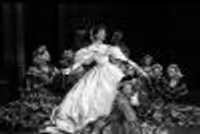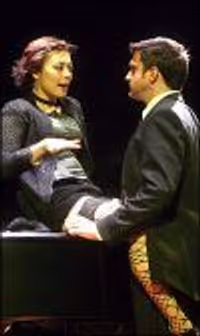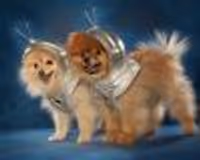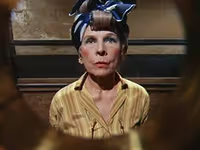Eye Teeth
#1re: Eye Teeth
Posted: 4/15/05 at 11:47pmThey are the four cuspids (canines).
#2re: Eye Teeth
Posted: 4/15/05 at 11:48pmruff ruff = thanks
#3re: Eye Teeth
Posted: 4/15/05 at 11:51pm
Also, I thought I read that Julie Andrews WAS offered the movie role of Mame. If she wanted to do it so badly, why didn't she?
#4re: Eye Teeth
Posted: 4/15/05 at 11:53pm
If I go to see her at Columbia College when she is here and if I get the chance, I'll ask her.
But I remember her saying the eye teeth thing in a chat moment on a special or on her show.
#5re: Eye Teeth
Posted: 4/15/05 at 11:56pm
aw, I saw "Columbia College" and got all excited, but wondered why I had no idea what you were referring to. Then Google revealed that it's not the Columbia I'm at. ![]()
#6re: Eye Teeth
Posted: 4/15/05 at 11:57pmawww sorry
#7re: Eye Teeth
Posted: 4/16/05 at 3:01amI use that phrase ALL the time "I'd give my eye teeth for...."
#9re: Eye Teeth
Posted: 4/16/05 at 8:41amPromise?
#10re: Eye Teeth
Posted: 5/9/06 at 6:10pmAnd then there's 'Long in the tooth.'
#11re: Eye Teeth
Posted: 5/9/06 at 6:24pmGood point. I use this phrase all the time, but it really makes no sense. Do you teeth get longer when you get older? What?
#12re: Eye Teeth
Posted: 5/9/06 at 6:36pm
The one that I always heard and never understood was "giving her the hairy eyeball". I always thought it sounded rather...shall we say...personal?
I finally looked it up:
To ‘give the hairy eyeball’ is to look at someone with suspicion or disapproval with partially lowered eyelids.
BORING.
#13re: Eye Teeth
Posted: 5/9/06 at 6:48pmI move we shorten the expression to Hairy balls...That would liven it up...
skeetshooter
Understudy Joined: 10/25/05
#15re: Eye Teeth
Posted: 5/9/06 at 7:55pmYour teeth do appear to get longer as your gums recede as you age. Thus Long in the tooth.
SweetQintheLights
Broadway Legend Joined: 6/12/05
#16re: Eye Teeth
Posted: 5/9/06 at 8:05pmWoah!! I didn't realize this thread was old and I thought ConvinceMe2 was back!
#17re: Eye Teeth
Posted: 5/9/06 at 8:53pm
The word eyetooth, which is of English origin, first appears in print in 1580. However, it was a while before it was used as the fulcrum for various expressions. In fact, to give one's eyeteeth for something was the last expression to come into play. It's first recorded in Somerset Maugham's Cakes and Ale, published in 1930: "He'd give his eye-teeth to have written a book half as good." Before that, expressions using eyeteeth related more to becoming an adult, and to acquiring the power and authority that comes with maturation. To cut one's eyeteeth, for example, 'to acquire wisdom and become worldly', first appeared in the 19th century. The Encyclopedia of Word and Phrase Origins says this expression derives from the fact that "the permanent set [of canines] is acquired when a child is passing into young adulthood. It is usually said in the negative, as in 'he hasn't cut his eyeteeth yet'." In the 1700s, eyeteeth referred mostly to the cuspids of dogs, and so, the EWPO speculates, "the phrase may have been suggested by the fact that fighting dogs were considered dangerous to handle when they developed their eyeteeth."
There's more. To draw one's eyeteeth means 'to take the conceit out of one'. To have one's eyeteeth means 'to be wide awake'. (Thomas Dyche, in the 1740 edition of his A New General English Dictionary defines eye-teeth as 'quickness or sharpness of understanding and parts'.) Two hundred and fifty years later, a search of the last twenty years of The New York Times reveals that of all the instances where eyeteeth is used in an expression, the overwhelming use is to give one's eyeteeth for something. Gloating over The National Gallery of Ireland's Caravaggio, for example, Director Raymond Keaveney told the Times in 1990 that "museum directors all over the world would give their eyeteeth to have a painting like this."
#18re: Eye Teeth
Posted: 5/9/06 at 9:21pm
Awesome Elphaba!
Thank you. :)
#19re: Eye Teeth
Posted: 5/9/06 at 9:28pmheck, If I can't use the reference skills I have....what good am I?
#20re: Eye Teeth
Posted: 10/20/06 at 8:25pmbump
#21re: Eye Teeth
Posted: 10/20/06 at 8:26pmSo, Glebb, did you get to ask her?
Vita, dulcedo, et spes nostra
Salve, Salve Regina
Ad te clamamus exsules filii Eva
Ad te suspiramus, gementes et flentes
O clemens O pia
#22re: Eye Teeth
Posted: 10/20/06 at 8:27pm
I got sick and couldn't go. ![]()
#23re: Eye Teeth
Posted: 10/20/06 at 8:35pmThat's a bummer... and anticlimactic for me because I was really looking forward to an update.
Vita, dulcedo, et spes nostra
Salve, Salve Regina
Ad te clamamus exsules filii Eva
Ad te suspiramus, gementes et flentes
O clemens O pia
#24re: Eye Teeth
Posted: 10/20/06 at 8:51pm
Yeah, sorry.
I felt terrible and made it through work but was just too under to go see Julie. ![]()
I did see her at Benedictine University a few years earlier.
Videos









